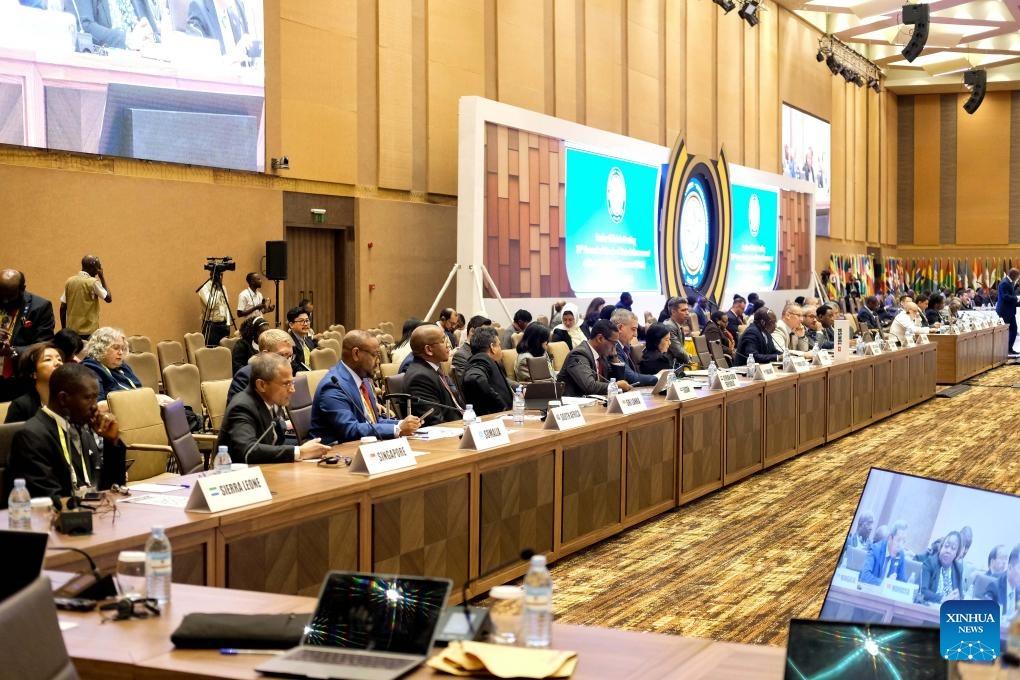 Senior officials from members of the Non-Aligned Movement attend a meeting in Kampala, the capital of Uganda, Jan 15, 2024. (PHOTO / XINHUA)
Senior officials from members of the Non-Aligned Movement attend a meeting in Kampala, the capital of Uganda, Jan 15, 2024. (PHOTO / XINHUA)
KAMPALA - Senior officials of the Non-Aligned Movement member countries on Monday started a two-day meeting here with a call that the issue of the Palestine-Israel crisis should top the agenda.
The meeting was opened by Yalchin Rafiyev, deputy minister of Foreign Affairs of Azerbaijan and head of the Azerbaijani delegation, who urged member countries to remain united amid complex global challenges.
"We continue to face challenges, we must remain united in making joint progress towards achieving a peaceful and prosperous world in a truly just and equitable world order”, Rafiyev said.
Ethiopia and Somaliland, a self-declared region of Somalia, signed an agreement allowing Ethiopia access to the Red Sea in return for its recognition of Somaliland as an independent state. Somalia described this as a violation of its territorial integrity
Azerbaijan assumed the chairmanship of NAM in 2019 and is set to hand it over to Uganda later this week.
Jeje Odongo, Uganda's minister of Foreign Affairs, urged member countries to exercise collective responsibility in addressing emerging issues. "It is crucial for us to address existing, new and emerging issues collectively and in the interest of our membership for the good of mankind”, Odongo said.
In the plenary session, Riyad Mansour, Palestine's ambassador to the UN, urged the members to address the Palestine-Israel crisis. Mansour argued that while the Movement faces several challenges, the crisis in the Middle East is the most pressing.
READ MORE: Israel to end intensive strikes in southern Gaza 'soon'
Mansour said there is a need for a humanitarian ceasefire. He said Palestinians are in urgent need of humanitarian aid like water, food, and fuel. "NAM forum from its inception has always supported the Palestinian people. We are confident that NAM will not leave Palestinian people outside”, he said.
Delegates from Lebanon, the United Arab Emirates, Iraq, Togo, Mauritania, and Maldives among others seconded the push to put the Israel-Palestine issue on top of the agenda.
READ MORE: Gaza crisis hits 100 days, Israeli PM vows to continue fighting
Hamza Adan Haadoow, permanent secretary of Somalia's Ministry of Foreign Affairs and International Cooperation, told the meeting that member states must also address the undermining of Somalia's sovereignty by one of its neighbors. Adan said one of its neighbors reached a memorandum of understanding with its regional states to access the sea. "We were requesting NAM delegates to support Somalia as a nation recovering from conflict. To help us safeguard our sovereignty, unity and integrity, which are the core principles (of NAM)”, he said.
Ethiopia and Somaliland, a self-declared region of Somalia, signed an agreement allowing Ethiopia access to the Red Sea in return for its recognition of Somaliland as an independent state. Somalia described this as a violation of its territorial integrity.
READ MORE: Yemen's Houthis ramp up attacks on shipping in Red Sea
According to Uganda's Ministry of Foreign Affairs, 93 countries out of the 120 member states of NAM are attending the meeting, which will culminate in the foreign ministers' meeting and the summit later this week.
The meeting is held under the theme titled "Deepening Cooperation For Shared Global Affluence." The summit is held every three years.
The NAM forum is guided by the Bandung Principles, which include respect for the sovereignty and territorial integrity of all nations, recognition of the equality of all races and nations, large and small, and abstention from intervention or interference in the internal affairs of other countries.
Uganda says it will use the summits to promote South-South cooperation and solidarity among member states.


